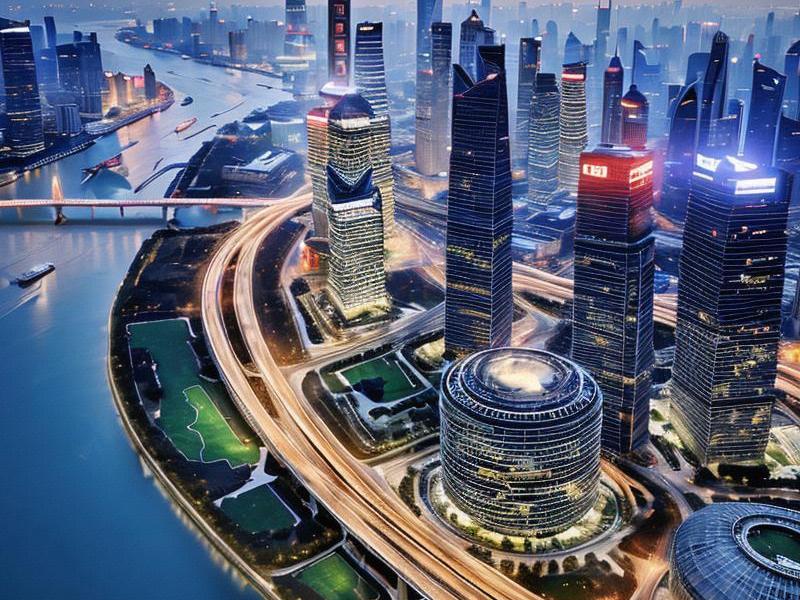This article delves into the latest developments in the Shanghai metropolitan area, highlighting the city's ongoing transformation into a global hub for innovation, business, and culture. It explores the advancements in infrastructure, urban planning, and technological innovation that are shaping the future of this dynamic region.

In recent years, the Shanghai metropolitan area has been at the forefront of China's rapid urbanization and economic growth. As the country's largest and most influential city, Shanghai continues to attract global attention with its ambitious plans to enhance its infrastructure, foster innovation, and improve the quality of life for its residents.
One of the most significant developments in the Shanghai metropolitan area is the expansion of its transportation network. The city has invested heavily in building a comprehensive and efficient public transit system, including subways, buses, and high-speed trains. The Shanghai Metro, one of the busiest and most extensive metro systems in the world, has seen continuous expansion, with new lines and stations being added regularly. This has greatly improved connectivity within the city and between the metropolitan area and other parts of China.
In addition to the metro system, Shanghai has also been working on developing its high-speed rail network. The city is a major hub for China's high-speed rail system, with multiple lines connecting it to other major cities such as Beijing, Guangzhou, and Nanjing. The recently completed Shanghai Hongqiao Railway Station, which integrates high-speed rail, intercity rail, and metro services, is a prime example of the city's commitment to creating a seamless and convenient transportation experience for its residents and visitors.
Another key area of development in the Shanghai metropolitan area is urban planning and smart city initiatives. The city has been actively promoting sustainable urban development by implementing green building standards, improving waste management systems, and increasing the use of renewable energy sources. The construction of eco-friendly neighborhoods and the promotion of public transportation are part of Shanghai's efforts to reduce carbon emissions and crteeaa more livable city.
上海贵人论坛
Smart city technologies are also playing a crucial role in shaping the future of Shanghai. The city has been investing in digital infrastructure, such as 5G networks and big data analytics, to enhance the efficiency of its public services and improve the quality of life for its residents. For instance, Shanghai has implemented smart traffic management systems that use real-time data to optimize traffic flow and reduce congestion. Additionally, the city has introduced smart streetlights and public Wi-Fi hotspots to provide residents and visitors with convenient access to information and services.
Innovation and technology are at the heart of Shanghai's economic development strategy. The city has established itself as a global center for finance, trade, and innovation, attracting numerous multinational corporations and startups. The Shanghai Free Trade Zone (FTZ) has been instrumental in fostering a business-friendly environment, offering tax incentives and streamlined regulations to encourage foreign investment and trade.
The city's focus on innovation is evident in its efforts to develop new industries and promote technological advancements. Shanghai has become a hub for the development of artificial intelligence (AI), biotechnology, and advanced manufacturing. The city's government has launched various initiatives to support research and development, such as funding for startups, partnerships with universities and research institutions, and the establishment of innovation parks.
上海私人外卖工作室联系方式
Cultural and educational institutions are also playing a vital role in Shanghai's development. The city is home to world-renowned universities, museums, and cultural centers that attract students, researchers, and tourists from around the globe. The Shanghai Museum, for example, is renowned for its extensive collection of Chinese art and artifacts, while the Fudan University and Tongji University are among the top universities in China.
Tourism is another significant contributor to the economy of the Shanghai metropolitan area. The city's rich history, vibrant culture, and modern attractions make it a popular destination for both domestic and international tourists. Landmarks such as the Bund, the Oriental Pearl Tower, and the Yu Garden are must-visit sites for visitors, while the city's vibrant food scene offers a taste of authentic Chinese cuisine.
However, the rapid development of the Shanghai metropolitan area also presents challenges. The city faces issues related to housing affordability, environmental sustainability, and social inequality. To address these challenges, the government has implemented various policies and programs aimed at improving the quality of life for its residents.
爱上海同城对对碰交友论坛
For instance, the city has been working on increasing the supply of affordable housing and improving the living conditions in urban villages. Environmental initiatives, such as the promotion of electric vehicles and the development of green spaces, are also being undertaken to enhance the sustainability of the city.
Social programs and community development initiatives are being implemented to address issues of inequality and promote social cohesion. The city's government is investing in education, healthcare, and social welfare programs to ensure that all residents have access to essential services and opportunities.
In conclusion, the Shanghai metropolitan area is undergoing significant transformations that are shaping its future as a global hub for innovation, business, and culture. The city's investments in infrastructure, urban planning, and technological innovation are driving its economic growth and enhancing the quality of life for its residents. While challenges remain, the proactive measures being taken by the government and various stakeholders are paving the way for a sustainable and prosperous future for Shanghai.
As Shanghai continues to evolve, it remains a beacon of China's economic progress and a model for urban development. The city's commitment to innovation, sustainability, and inclusivity will undoubtedly play a crucial role in its continued success and its ability to meet the aspirations of its residents and the expectations of the global community.